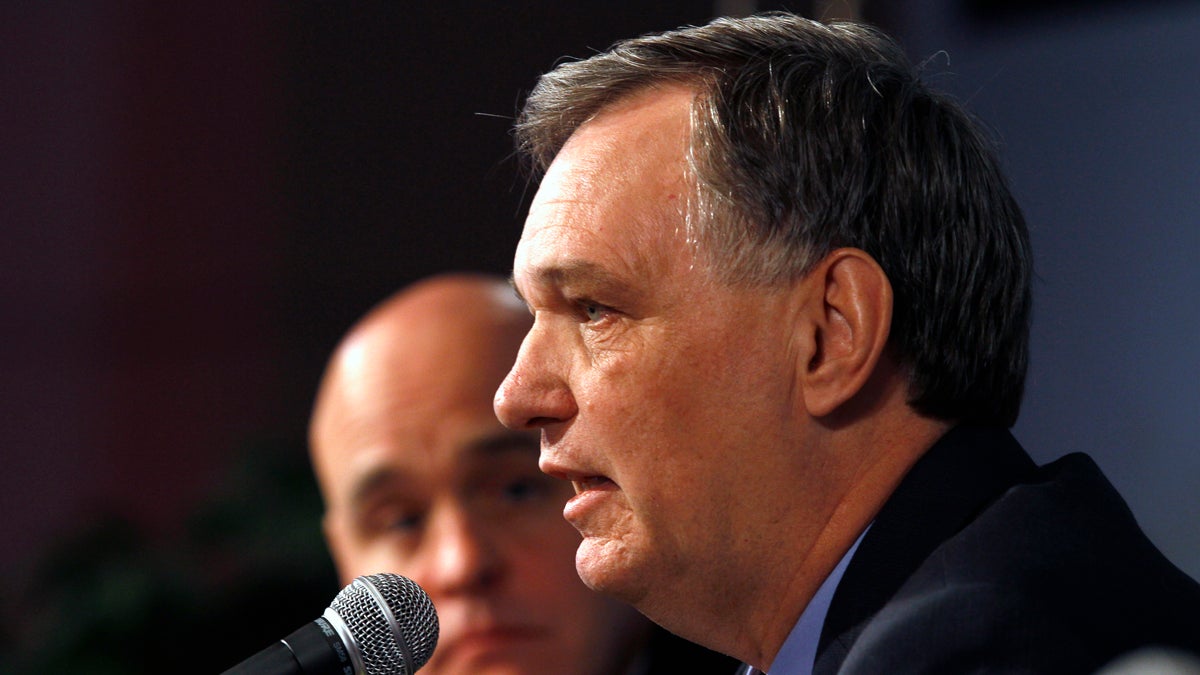Hanger exits Pa. guv’s race, leaves questions hanging

Former Pennsylvania environmental protection secretary John Hanger during a gubernatorial candidates forum Tuesday Feb. 4, 2014 in Philadelphia. (Jacqueline Larma/AP Photo)
When I heard yesterday that John Hanger was dropping out of the governor’s race, I felt a pang. I’ve moderated two forums of the Democratic gubernatorial candidates, and his answers were always sharp and substantive.
Which didn’t surprise me. I used to talk to Hanger 25 years ago when he was a public interest lawyer in Philadelphia battling utilities on rate cases. After that, he went to the PUC and eventually served as Gov. Ed Rendell’s secretary of the Department of Environmental Protection.
I’m not saying there aren’t other smart, policy-savvy people in this race.There are. But Hanger was a guy who came into the race a long time ago without much traditional political juice, staking his claim on being somebody with real answers, period.
Taking stock
Hanger said in a Harrisburg news conference he was getting out because he didn’t see a path to victory, that Tom Wolf’s TV blitz made it impossible for him to get the poll movement that would convince donors to fund a credible TV campaign.
I called Hanger to ask him to reflect a little more on the experience.
He described how moving it was to meet people struggling to get by, and how he thought the political and economic leaders of the country are too focused on themselves. I asked what he thought of the media coverage of the campaign.
Well, there were some problems, he said. He found it frustrating to read media accounts saying all the Democratic candidates agreed on everything except marijuana legalization, when he had what he felt was by far the most comprehensive jobs plan, among others.
“The political press are now in league — unwittingly, not deliberately — with the top one-tenth of 1 percent that funds these political campaigns,” Hanger said, “because the political press starts from the premise that if you don’t have the money, you’re a second-tier candidate, and we’re going to call you second tier from the beginning, and we’re going to report on you as second tier.”
The political press then says, Hanger told me, that “we’re going to order stories so that you appear fourth or fifth in the story every time,” he said. “We’re not going to go to you for comment when we go to others for comment, and the justification is that somebody else is going to have much more money. And it’s self-reinforcing.”
“If the press played it straight and said, ‘Yeah, these people are all qualified, let’s look at the details of what they’re proposing, and we’re not going to skew the coverage based on the money a self-funder or others have going in to the race,'” he said, things might be different.
I want to emphasize that Hanger didn’t bring up media coverage. I asked him, because I’m troubled by the shortcomings of so much political reporting. And because I really did mean to read his jobs plan, but didn’t.
The game changes
On the level of political strategy, Hanger said he was actually harmed by Gov. Tom Corbett’s plunging poll numbers. Hanger was the first Democrat in the race in November 2012. He didn’t anticipate a large field in the primary, and it’s conceivable he could have been the strongest candidate if some of the better-known Democrats stayed out.
Hanger said when Corbett’s poll numbers continued to weaken, some who’d told him they didn’t plan to run changed their minds, and it was a much tougher field to run in.
I asked Hanger if there’s anything he could have done differently.
“I could have sat on the phone and called people for money all day,” he said with a chuckle. “But it wouldn’t have made any difference, because I could never outspend these people. And second, it’s just not something I can bring myself to do.”
“You know, that’s fundamentally what’s wrong with this system,” he said. “It’s not just that money wins. It’s that money changes the conversation, and to whom you talk. I’m very glad I talked to the people I did, the vast majority of whom never gave a penny and were never asked for a penny.”
WHYY is your source for fact-based, in-depth journalism and information. As a nonprofit organization, we rely on financial support from readers like you. Please give today.


